【新课标】Module 1 Unit 2 The Grand Canyon was not just big 课件
文档属性
| 名称 | 【新课标】Module 1 Unit 2 The Grand Canyon was not just big 课件 | 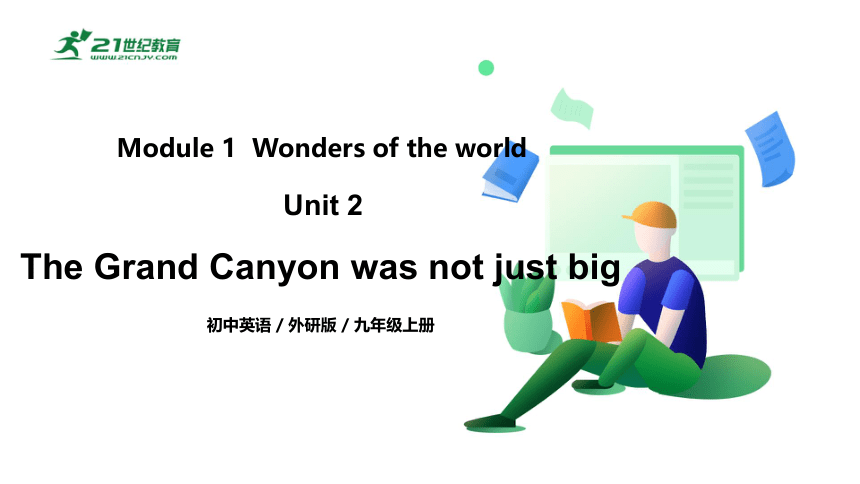 | |
| 格式 | pptx | ||
| 文件大小 | 8.9MB | ||
| 资源类型 | 试卷 | ||
| 版本资源 | 外研版 | ||
| 科目 | 英语 | ||
| 更新时间 | 2022-07-04 10:21:03 | ||
图片预览

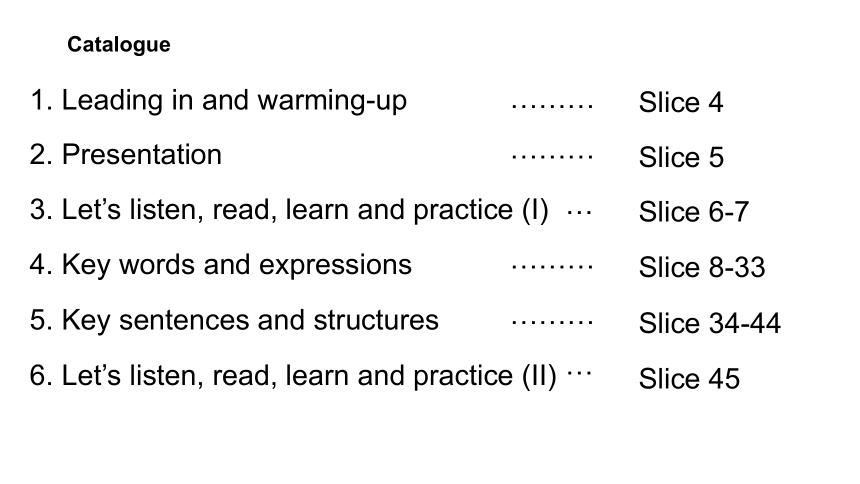
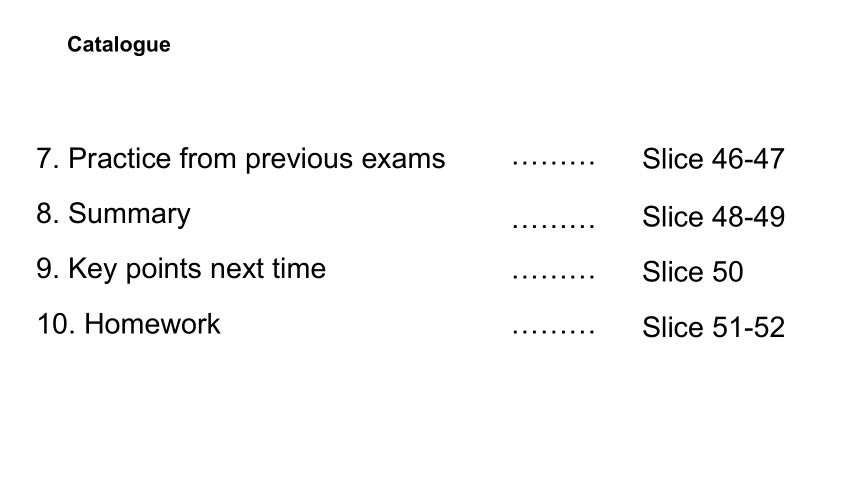
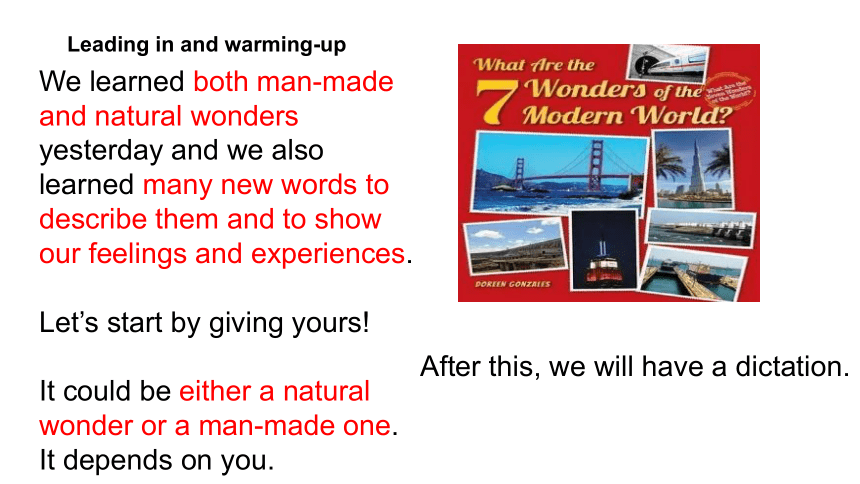
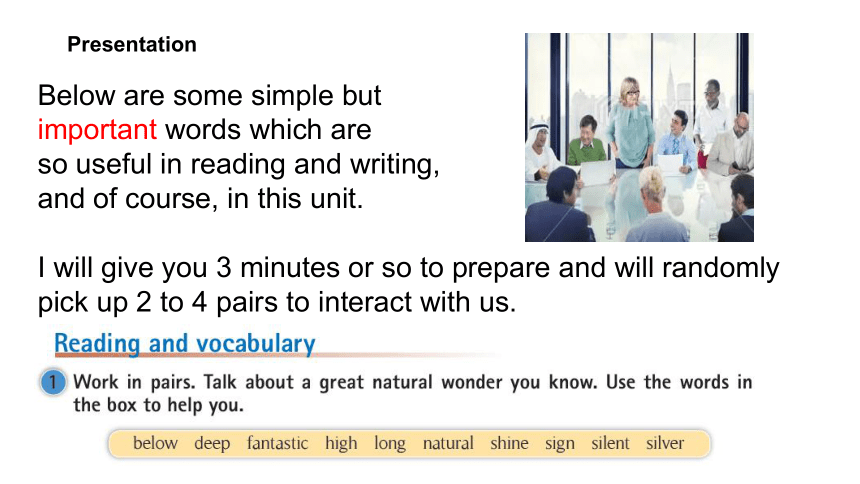
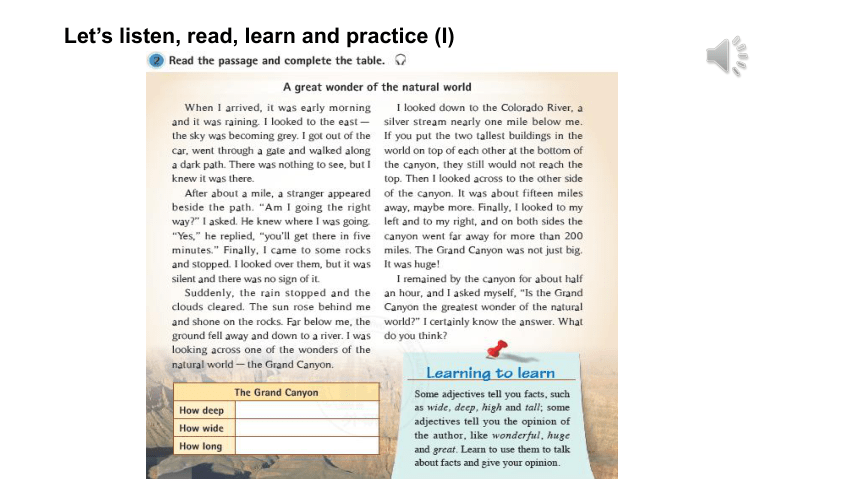
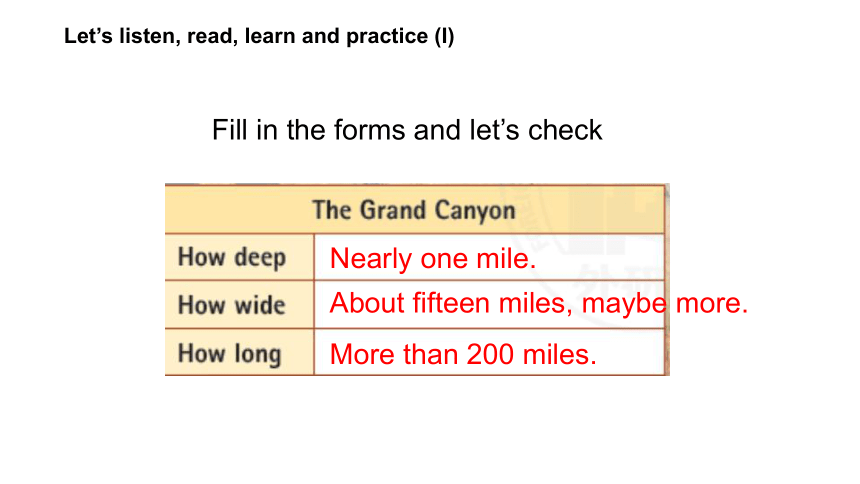
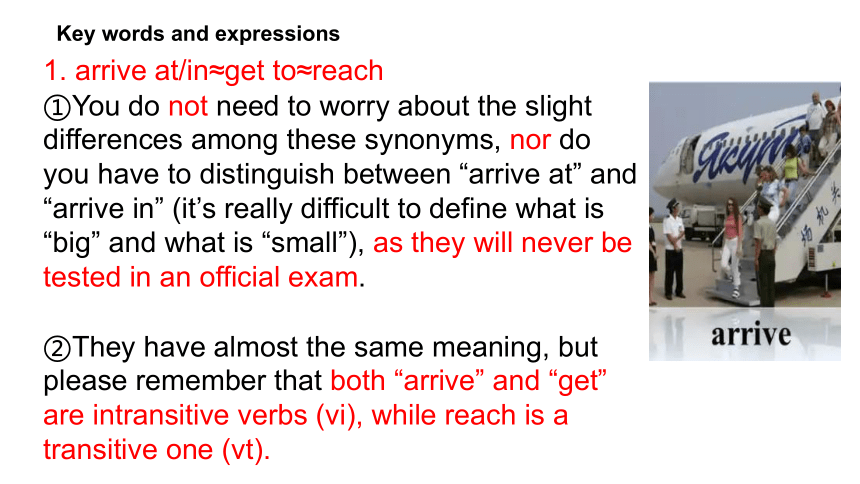
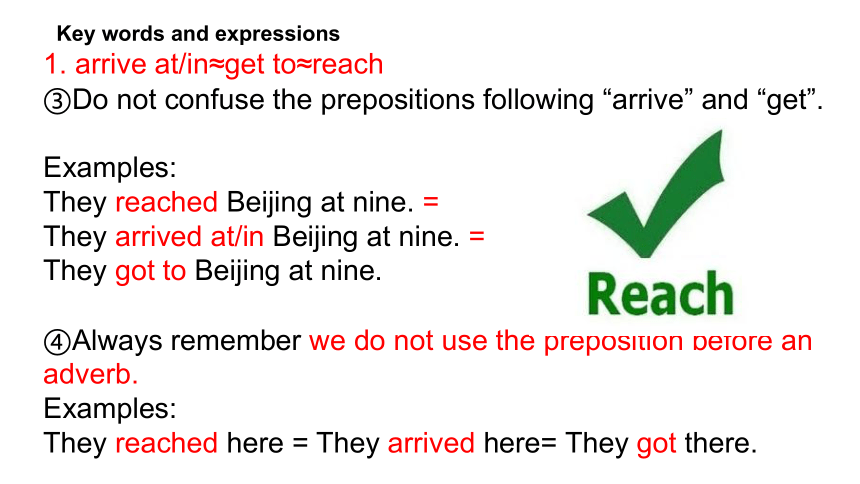
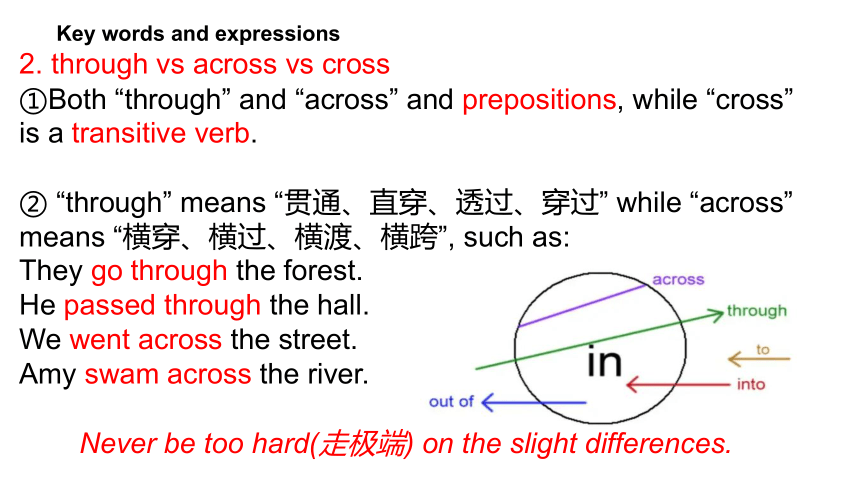
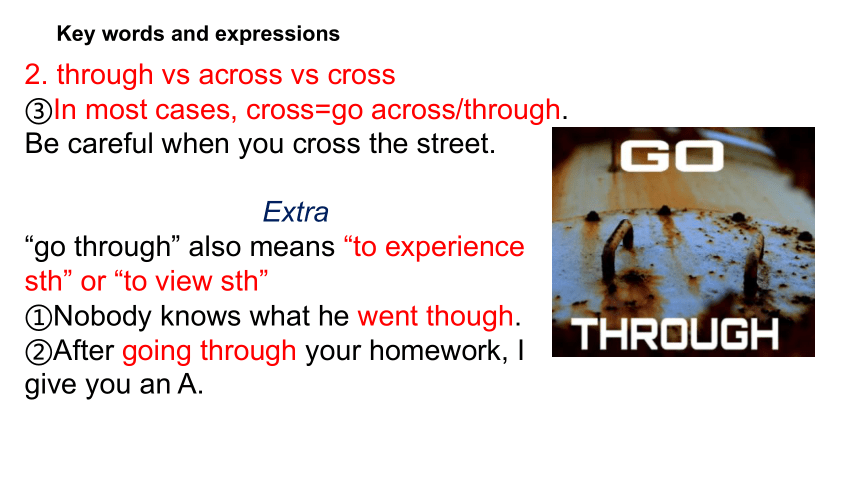
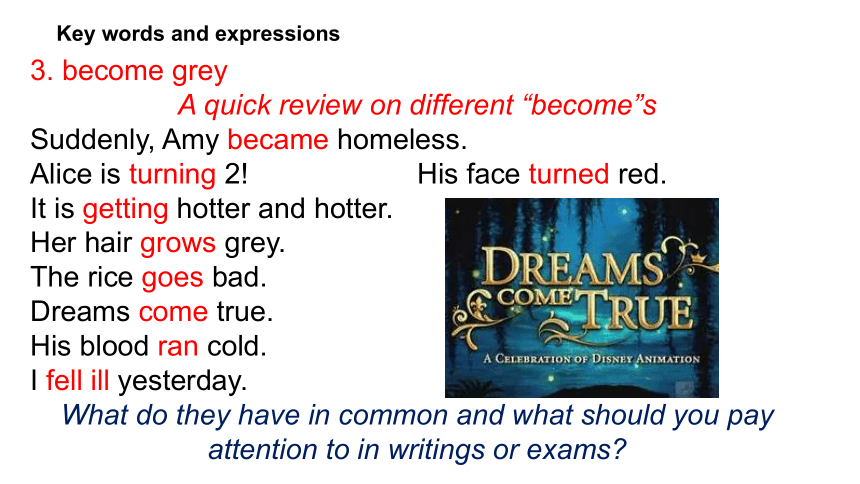
文档简介
(共54张PPT)
The Grand Canyon was not just big
初中英语 / 外研版 / 九年级上册
Module 1 Wonders of the world
Unit 2
Catalogue
1. Leading in and warming-up
2. Presentation
3. Let’s listen, read, learn and practice (I)
4. Key words and expressions
5. Key sentences and structures
6. Let’s listen, read, learn and practice (II)
Slice 4
Slice 5
Slice 6-7
Slice 8-33
Slice 34-44
Slice 45
………
………
………
………
…
…
Catalogue
7. Practice from previous exams
8. Summary
9. Key points next time
10. Homework
Slice 50
Slice 46-47
Slice 48-49
Slice 51-52
………
………
………
………
Leading in and warming-up
We learned both man-made and natural wonders yesterday and we also learned many new words to describe them and to show our feelings and experiences.
Let’s start by giving yours!
It could be either a natural wonder or a man-made one.
It depends on you.
After this, we will have a dictation.
Presentation
Below are some simple but
important words which are
so useful in reading and writing,
and of course, in this unit.
I will give you 3 minutes or so to prepare and will randomly pick up 2 to 4 pairs to interact with us.
Let’s listen, read, learn and practice (I)
Let’s listen, read, learn and practice (I)
Fill in the forms and let’s check
More than 200 miles.
About fifteen miles, maybe more.
Nearly one mile.
Key words and expressions
1. arrive at/in≈get to≈reach
①You do not need to worry about the slight differences among these synonyms, nor do you have to distinguish between “arrive at” and “arrive in” (it’s really difficult to define what is “big” and what is “small”), as they will never be tested in an official exam.
②They have almost the same meaning, but please remember that both “arrive” and “get” are intransitive verbs (vi), while reach is a transitive one (vt).
Key words and expressions
1. arrive at/in≈get to≈reach
③Do not confuse the prepositions following “arrive” and “get”.
Examples:
They reached Beijing at nine. =
They arrived at/in Beijing at nine. =
They got to Beijing at nine.
④Always remember we do not use the preposition before an adverb.
Examples:
They reached here = They arrived here= They got there.
Key words and expressions
2. through vs across vs cross
①Both “through” and “across” and prepositions, while “cross” is a transitive verb.
② “through” means “贯通、直穿、透过、穿过” while “across” means “横穿、横过、横渡、横跨”, such as:
They go through the forest.
He passed through the hall.
We went across the street.
Amy swam across the river.
Never be too hard(走极端) on the slight differences.
Key words and expressions
2. through vs across vs cross
③In most cases, cross=go across/through.
Be careful when you cross the street.
Extra
“go through” also means “to experience sth” or “to view sth”
①Nobody knows what he went though.
②After going through your homework, I give you an A.
Key words and expressions
3. become grey
A quick review on different “become”s
Suddenly, Amy became homeless.
Alice is turning 2! His face turned red.
It is getting hotter and hotter.
Her hair grows grey.
The rice goes bad.
Dreams come true.
His blood ran cold.
I fell ill yesterday.
What do they have in common and what should you pay attention to in writings or exams
Key words and expressions
4. strange
①It means “not familiar with sth”;
He stood in a strange street and lived in a strange city.
②It means “weird” or “unusual”
He had a strange expression/look on his face.
Extra
①stranger
A policeman asked the stranger to show his passport.
Key words and expressions
4. strange
Extra
②It is/seems (so) adj (that)…
We learned the structure “sb be adj (that)…” last time, now let’s
have a quick discussion on “It is/seems adj (that)…” (since “that” is there, the sentence pattern should be followed by a complete sentence.)
It seemed strange (that) she would leave so early.
It is so clear (that) he made a mistake.
It seemed not OK (that) you talk so loudly in public.
Key words and expressions
4. strange
Extra
③Both structures can be shortened,
using “to do” to replace “(that)…”
only if the subjects are the same one
or there is “no” subject.
It seems strange to play without teamwork.
I am happy to meet you. = I am happy that I meet you.
It seems impolite to talk so loudly in public.
Key words and expressions
5. appear
①≈show up
A ship appeared on the sea.
His book appeared on the market.
So many mistakes appeared in your writing.
②≈seem≈look (Linking verb)
You appeared/seemed/looked very confident.
He appears/seems/looks unhappy
Extra
①appearance (appear + -ance)
②disappear/disappearance (dis- + appear)
Key words and expressions
6. silent vs quiet
①silent: making no sound; still
The silent film is amazing.
If you are arrested, you have the
right to remain silent.
②quiet: making no noise or sound, especially no disturbing sound
You must keep quiet in public, like a hospital or a library.
I prefer a quiet street to a noisy one.
Extra
silence (n)
Talking is silver while silence is gold.
Key words and expressions
7. silver vs gold/golden
①silver: It is a noun as well as an adjective. Being an adjective,
it means both “sth made of silver” and “sth gives the color of silver” depending on the context.
She wore a silver necklace around her neck.
Wow, the silver moon is so beautiful.
②However, gold, being an adjective, only means “sth made of gold that give the color”, while “golden” means “sth NOT
made of gold giving the color of gold”
Key words and expressions
7. silver vs gold/golden
So is it “a gold moon on Mid-Autumn Festival”
or “a golden moon on Mid-Autumn Festival”
I bought a gold ring for my mom as a gift.
The Olympic winner received a gold medal.
Her hair is golden.
It is the golden period for the students to learn new things.
We believe this is a golden chance to stand out.
Key words and expressions
8. reply vs answer
①When used as a verb, “reply” is an intransitive one, always followed by “to sth” rather than “to sb”; and of course, it is also a noun.
It is odd that they did not reply to our letter.
She is the only person who reply to the invitation.
He gave me no chance to reply to his question.
The softness of his reply calmed her down.
Why did I not get your reply yesterday
Key words and expressions
8. reply vs answer
②“answer”, in most cases, is a transitive verb, can be followed by both “(to) sth” and “(to) sb”, but in a less formal(正式) yet more colloquial(口语化) way compared with “reply”.
Would you please answer my questions
He answered that he knew nothing about it.
He has so many emails to answer every day.
I have to type letters and answer the phone.
Look at me now and answer me!
If you think carefully, you will find the answer.
He knocked at the door but there was no answer.
Key words and expressions
8. reply vs answer
③“answer” also means “key” as a noun and they both are always followed by “to sth”.
Do you know the answer/key to the question
Please write everything on the answer sheet.
Key words and expressions
9. beside, below, behind, before…
Do you still remember what “Compounding”, the concept we learned last time, means
What do the words listed above
have in common
Yes, they all begin with “be-”.
So what does “be-” mean here Most of the time,
it is to stress the latter part of the word.
Key words and expressions
9. beside, below, behind, before…
①”side” means “one of the surfaces forming the outside of sth”,
so “be+side” means “by or at the side of; near”; “beside” also means “it has nothing to do with…”
The little girl is sitting beside her mother.
Our success seems small beside his.
What you said may be right,
but it is beside the question.
②Similarly, you can also know the meanings of “low”,
“hind”, and “fore”.
Key words and expressions
9. beside, below, behind, before…
Extra I
①He likes to play football when he is in a low spirit/mood.
②He got great success even though/if he has a low family background.
③From hindsight, everyone is smarter and everything is easier.
④Hindsight is always better than foresight.
⑤He is looking forward to meeting you.
⑥Go forward and you will see it to your left.
Key words and expressions
9. beside, below, behind, before…
Extra II
①”besides” means “moreover; furthermore;
also, in addition”,
No one writes to me besides you.
There will be five of us for dinner, besides John.
(altogether six people)
②”except” means “with the exclusion of; excluding; save; but”
There will be five of us for dinner, except John.
(John NOT having dinner with us)
③exception: without any exception
Key words and expressions
10. both vs all
A quick review on “both”, “all”, “either”, “each” and “every”
①”both” means ” one and the other; two together”; while “all” means “the whole number of when more than two”,
Both are good. (altogether two persons/things)
Both of us knew it. (altogether two persons)
②”either” means “one or the other of two;
each of two; the one and the other”
You may sit at either end of the table.
(altogether two sides)
Key words and expressions
10. both vs all
A quick review on “both”, “all”, “either”, “each” and “every”
③”every” is more focused on “the group”, while “each” is more focused on “individuals”, try comparing the following examples:
Each (of the) children received a gift.
Every child in the world is an angel.
Extra
“neither” means “no+either”, and none
means “no+one”:
I will join in neither game.
None of my classmates is/are taller than I
Key words and expressions
11. remain
①to continue
I hope the world is to remain at peace.
②to stay behind or in the same place
I'll remain here when you go to the airport.
I didn't remain long in the city.
The bad feeling still remains in me!
③to be left to be done, told, shown, etc.
Nothing remained when they left.
Only a few leaves remained on the tree.
Key words and expressions
11. remain
④≈keep≈stay≈stand≈continue≈hold (Linking verbs)
He remained silent. )
It remained a secret.
⑤It remains to be done (…)
That remains to be proved.
It remains to be seen if you are right this time.
⑥as a noun, usually remains. something that remains or is left
The remains of the food should not be wasted.
The scientists found so many remains on site.
Key words and expressions
12. by
①When it is followed by a place, as showed in the text, it means “near or next to”
Let’s sit by the fire.
He bought a house by the river last year.
②When it is followed by a time,
it means “no later than, at or before”
I usually finish homework by five o'clock.
You must hand in the assignment by Tuesday next week.
Key words and expressions
12. by
③on, as a means of the medium
He came by the highway.
She arrived by air.
They arrived by ship.
Tom writes by his left hand.
④ to and beyond; past
He went by the church.
He's taller than his sister by three centimeters
Key words and expressions
12. by
⑤according to:
This is a bad movie by any standards.
⑥after; next after, as of the same items in a series:
piece by piece; little by little; step by step
⑦showing the difference between figures:
The price went up by 2% last month.
⑧as a result:
We met by chance.
They won by cheating.
Key sentences and structures
1. There was nothing to see…
A quick review on Compound Indefinite Pronouns(不定代词)
①Be seen as a singular form
Everything begins to seem right.
Everybody is here except Tom.
Nothing is being taught right now.
②When modifying an adjective,
the pronoun is put after the modificand(被修饰者)
There is nothing wrong with my computer.
There is something new in today’s newspaper.
Is there anyone else in the room
Key sentences and structures
1. There was nothing to see…
A quick review on Compound Indefinite Pronouns
③The Compound Indefinite Pronouns are always combined with the “to do” structure.
I have something important to tell you.
There is nothing wrong to protect that poor boy.
Anything to do right now
Key sentences and structures
2. You’ll get there in five minutes.
In most cases, we use “in” to express “after a certain period” in the future tenses.
He will arrive in Beijing in 3 days.
The plane takes off in 10 minutes.
Key sentences and structures
3. Prepositions and “look”
As we all know, “look” is an intransitive verb most of the time, which means that it must be followed by different prepositions to show different meanings and to show the sentences on a more precise level.
① to vs at
to: shows “in the direction of; toward”
at: shows “target”
He looked to his right but saw nothing.
He looked right at me and smiled.
Key sentences and structures
3. Prepositions and “look”
① to vs at
to: shows “in the direction of; toward”
at: shows “target”
Try to compare the following sentences and understand the slight differences showed by the writer:
The dog runs to me.
The dog runs at me.
He threw the ball to me but I didn’t catch it.
He threw the ball at me and I ran away.
Key sentences and structures
3. Prepositions and “look”
② for: shows “purpose of; belong to”
He is looking for his wallet.
Every student should work for their future.
③ over: sometimes “over” means “again” or “once more”, so “look over” means “look again and again” and therefore, “to check” or “to look through quickly”.
I 'll look over your exam papers soon.
The teacher is now looking over who did it.
Please look over your exercises
Key sentences and structures
3. Prepositions and “look”
④ look after≈take care of
He is looking after his little brother.
I can take care of everything
when you are gone.
⑤ look up
You can look it up in the dictionary.
⑥ look up to = respect
Do something special so they can look up to you.
⑦ Look out!=Watch out!
Key sentences and structures
3. Prepositions and “look”
⑧ look down on/upon
Don't look down on/upon the role women can play.
Never look down on/upon anyone as nobody likes to be looked down on/upon.
⑨look into≈look over or research
They have begun to look into the problem.
I usually look into a book’s catalog before
deciding whether to read it.
Key sentences and structures
4. A quick preview at “did” and “done”
What do they have in common and what are the differences
①I saw the movie yesterday.
It happened, but it has nothing
to do with the present.
②I have seen the movie already.
It happened, but it may imply something
depending on the context, such as “I don’t want to go to see the movie with you” or
“Are you interested I can tell you some plots.” etc.
Key sentences and structures
5. A quick review on the
superlative degree
①one of the……
②most=very (when “most” not following “the”)
It is a most important problem. =It is a very important problem.
③the very + superlative degree=much + the superlative degree
This is the very best. = This is much the best.
Key sentences and structures
5. A quick review on the superlative degree
④”by far, far, much, mostly, almost……”
can be followed by the superlative degree.
This boy is by far/almost the best one.
⑤a negative word + the “comparative degree” =
a negative word + so/as……as……= the superlative degree
Nothing is so/as bad as this.
=Nothing is worse than this.
=This is the worst thing.
Let’s listen, read, learn and practice (II)
You have ten minutes to complete the questions in 3 and 4.
sign
silent
remain
sky
mile
below
stream
through
reply
Practice from previous exams
1. I have _____ all my papers but I still can't find my notes.
A.looked through B.looked for
C.looked after D.looked out
2. Would you please ___ the paper for me and see if there are any obvious mistakes
A.look around B.look into
C.look up D.look through
3. The building around the corner caught fire last night.The police are now ______ the matter.
A.seeing through B.working out
C.looking into D.watching out
A
A
C
Practice from previous exams
4.Come and sit ______________(我旁边).
5.There is a big tree ______________ (在河边).
6. ______________(到上星期日), I had finished the book.
7.Can you finish the work ______________ (在五点之前).
8.She came home ________________(乘飞机)
9. I don't know whether mom _________ me to Beijing next week.
A. take B. takes C. will take D. would take
10. I’m so lucky because I _________ see more cartoons next month.
is able to B. will be able to
C. be able to D. was able to
by/beside me
by/beside the river
By last Sunday
by 5 o’clock
by air/plane
C
B
Summary
So what have we got
Key words and expressions 1. arrive at/in≈get to≈reach 2. through vs across vs cross
3. become grey 4. strange
5. appear 6. silent vs quiet
7. silver vs gold/golden 8. reply vs answer
9. beside,below,behind,before… 10. both vs all
11. remain 12. by
Summary
So what have we got
Key sentences and structures
1. There was nothing to see…
2. You’ll get there in five minutes.
3. Prepositions and “look”
4. A quick preview at “did” and “done”
5. A quick review on the superlative degree
Key points next time
1. Complete all the questions in Unit 3.
2. A detailed review on 6 tenses.
Homework
1. Finish the Writing part
Homework
2. Review the notes taken at class,
especially the key parts;
3. Recite all the key words and
expressions, paraphrases included;
4. Preview Unit 3.
谢谢
21世纪教育网(www.21cnjy.com)
中小学教育资源网站
兼职招聘:
https://www.21cnjy.com/recruitment/home/admin
The Grand Canyon was not just big
初中英语 / 外研版 / 九年级上册
Module 1 Wonders of the world
Unit 2
Catalogue
1. Leading in and warming-up
2. Presentation
3. Let’s listen, read, learn and practice (I)
4. Key words and expressions
5. Key sentences and structures
6. Let’s listen, read, learn and practice (II)
Slice 4
Slice 5
Slice 6-7
Slice 8-33
Slice 34-44
Slice 45
………
………
………
………
…
…
Catalogue
7. Practice from previous exams
8. Summary
9. Key points next time
10. Homework
Slice 50
Slice 46-47
Slice 48-49
Slice 51-52
………
………
………
………
Leading in and warming-up
We learned both man-made and natural wonders yesterday and we also learned many new words to describe them and to show our feelings and experiences.
Let’s start by giving yours!
It could be either a natural wonder or a man-made one.
It depends on you.
After this, we will have a dictation.
Presentation
Below are some simple but
important words which are
so useful in reading and writing,
and of course, in this unit.
I will give you 3 minutes or so to prepare and will randomly pick up 2 to 4 pairs to interact with us.
Let’s listen, read, learn and practice (I)
Let’s listen, read, learn and practice (I)
Fill in the forms and let’s check
More than 200 miles.
About fifteen miles, maybe more.
Nearly one mile.
Key words and expressions
1. arrive at/in≈get to≈reach
①You do not need to worry about the slight differences among these synonyms, nor do you have to distinguish between “arrive at” and “arrive in” (it’s really difficult to define what is “big” and what is “small”), as they will never be tested in an official exam.
②They have almost the same meaning, but please remember that both “arrive” and “get” are intransitive verbs (vi), while reach is a transitive one (vt).
Key words and expressions
1. arrive at/in≈get to≈reach
③Do not confuse the prepositions following “arrive” and “get”.
Examples:
They reached Beijing at nine. =
They arrived at/in Beijing at nine. =
They got to Beijing at nine.
④Always remember we do not use the preposition before an adverb.
Examples:
They reached here = They arrived here= They got there.
Key words and expressions
2. through vs across vs cross
①Both “through” and “across” and prepositions, while “cross” is a transitive verb.
② “through” means “贯通、直穿、透过、穿过” while “across” means “横穿、横过、横渡、横跨”, such as:
They go through the forest.
He passed through the hall.
We went across the street.
Amy swam across the river.
Never be too hard(走极端) on the slight differences.
Key words and expressions
2. through vs across vs cross
③In most cases, cross=go across/through.
Be careful when you cross the street.
Extra
“go through” also means “to experience sth” or “to view sth”
①Nobody knows what he went though.
②After going through your homework, I give you an A.
Key words and expressions
3. become grey
A quick review on different “become”s
Suddenly, Amy became homeless.
Alice is turning 2! His face turned red.
It is getting hotter and hotter.
Her hair grows grey.
The rice goes bad.
Dreams come true.
His blood ran cold.
I fell ill yesterday.
What do they have in common and what should you pay attention to in writings or exams
Key words and expressions
4. strange
①It means “not familiar with sth”;
He stood in a strange street and lived in a strange city.
②It means “weird” or “unusual”
He had a strange expression/look on his face.
Extra
①stranger
A policeman asked the stranger to show his passport.
Key words and expressions
4. strange
Extra
②It is/seems (so) adj (that)…
We learned the structure “sb be adj (that)…” last time, now let’s
have a quick discussion on “It is/seems adj (that)…” (since “that” is there, the sentence pattern should be followed by a complete sentence.)
It seemed strange (that) she would leave so early.
It is so clear (that) he made a mistake.
It seemed not OK (that) you talk so loudly in public.
Key words and expressions
4. strange
Extra
③Both structures can be shortened,
using “to do” to replace “(that)…”
only if the subjects are the same one
or there is “no” subject.
It seems strange to play without teamwork.
I am happy to meet you. = I am happy that I meet you.
It seems impolite to talk so loudly in public.
Key words and expressions
5. appear
①≈show up
A ship appeared on the sea.
His book appeared on the market.
So many mistakes appeared in your writing.
②≈seem≈look (Linking verb)
You appeared/seemed/looked very confident.
He appears/seems/looks unhappy
Extra
①appearance (appear + -ance)
②disappear/disappearance (dis- + appear)
Key words and expressions
6. silent vs quiet
①silent: making no sound; still
The silent film is amazing.
If you are arrested, you have the
right to remain silent.
②quiet: making no noise or sound, especially no disturbing sound
You must keep quiet in public, like a hospital or a library.
I prefer a quiet street to a noisy one.
Extra
silence (n)
Talking is silver while silence is gold.
Key words and expressions
7. silver vs gold/golden
①silver: It is a noun as well as an adjective. Being an adjective,
it means both “sth made of silver” and “sth gives the color of silver” depending on the context.
She wore a silver necklace around her neck.
Wow, the silver moon is so beautiful.
②However, gold, being an adjective, only means “sth made of gold that give the color”, while “golden” means “sth NOT
made of gold giving the color of gold”
Key words and expressions
7. silver vs gold/golden
So is it “a gold moon on Mid-Autumn Festival”
or “a golden moon on Mid-Autumn Festival”
I bought a gold ring for my mom as a gift.
The Olympic winner received a gold medal.
Her hair is golden.
It is the golden period for the students to learn new things.
We believe this is a golden chance to stand out.
Key words and expressions
8. reply vs answer
①When used as a verb, “reply” is an intransitive one, always followed by “to sth” rather than “to sb”; and of course, it is also a noun.
It is odd that they did not reply to our letter.
She is the only person who reply to the invitation.
He gave me no chance to reply to his question.
The softness of his reply calmed her down.
Why did I not get your reply yesterday
Key words and expressions
8. reply vs answer
②“answer”, in most cases, is a transitive verb, can be followed by both “(to) sth” and “(to) sb”, but in a less formal(正式) yet more colloquial(口语化) way compared with “reply”.
Would you please answer my questions
He answered that he knew nothing about it.
He has so many emails to answer every day.
I have to type letters and answer the phone.
Look at me now and answer me!
If you think carefully, you will find the answer.
He knocked at the door but there was no answer.
Key words and expressions
8. reply vs answer
③“answer” also means “key” as a noun and they both are always followed by “to sth”.
Do you know the answer/key to the question
Please write everything on the answer sheet.
Key words and expressions
9. beside, below, behind, before…
Do you still remember what “Compounding”, the concept we learned last time, means
What do the words listed above
have in common
Yes, they all begin with “be-”.
So what does “be-” mean here Most of the time,
it is to stress the latter part of the word.
Key words and expressions
9. beside, below, behind, before…
①”side” means “one of the surfaces forming the outside of sth”,
so “be+side” means “by or at the side of; near”; “beside” also means “it has nothing to do with…”
The little girl is sitting beside her mother.
Our success seems small beside his.
What you said may be right,
but it is beside the question.
②Similarly, you can also know the meanings of “low”,
“hind”, and “fore”.
Key words and expressions
9. beside, below, behind, before…
Extra I
①He likes to play football when he is in a low spirit/mood.
②He got great success even though/if he has a low family background.
③From hindsight, everyone is smarter and everything is easier.
④Hindsight is always better than foresight.
⑤He is looking forward to meeting you.
⑥Go forward and you will see it to your left.
Key words and expressions
9. beside, below, behind, before…
Extra II
①”besides” means “moreover; furthermore;
also, in addition”,
No one writes to me besides you.
There will be five of us for dinner, besides John.
(altogether six people)
②”except” means “with the exclusion of; excluding; save; but”
There will be five of us for dinner, except John.
(John NOT having dinner with us)
③exception: without any exception
Key words and expressions
10. both vs all
A quick review on “both”, “all”, “either”, “each” and “every”
①”both” means ” one and the other; two together”; while “all” means “the whole number of when more than two”,
Both are good. (altogether two persons/things)
Both of us knew it. (altogether two persons)
②”either” means “one or the other of two;
each of two; the one and the other”
You may sit at either end of the table.
(altogether two sides)
Key words and expressions
10. both vs all
A quick review on “both”, “all”, “either”, “each” and “every”
③”every” is more focused on “the group”, while “each” is more focused on “individuals”, try comparing the following examples:
Each (of the) children received a gift.
Every child in the world is an angel.
Extra
“neither” means “no+either”, and none
means “no+one”:
I will join in neither game.
None of my classmates is/are taller than I
Key words and expressions
11. remain
①to continue
I hope the world is to remain at peace.
②to stay behind or in the same place
I'll remain here when you go to the airport.
I didn't remain long in the city.
The bad feeling still remains in me!
③to be left to be done, told, shown, etc.
Nothing remained when they left.
Only a few leaves remained on the tree.
Key words and expressions
11. remain
④≈keep≈stay≈stand≈continue≈hold (Linking verbs)
He remained silent. )
It remained a secret.
⑤It remains to be done (…)
That remains to be proved.
It remains to be seen if you are right this time.
⑥as a noun, usually remains. something that remains or is left
The remains of the food should not be wasted.
The scientists found so many remains on site.
Key words and expressions
12. by
①When it is followed by a place, as showed in the text, it means “near or next to”
Let’s sit by the fire.
He bought a house by the river last year.
②When it is followed by a time,
it means “no later than, at or before”
I usually finish homework by five o'clock.
You must hand in the assignment by Tuesday next week.
Key words and expressions
12. by
③on, as a means of the medium
He came by the highway.
She arrived by air.
They arrived by ship.
Tom writes by his left hand.
④ to and beyond; past
He went by the church.
He's taller than his sister by three centimeters
Key words and expressions
12. by
⑤according to:
This is a bad movie by any standards.
⑥after; next after, as of the same items in a series:
piece by piece; little by little; step by step
⑦showing the difference between figures:
The price went up by 2% last month.
⑧as a result:
We met by chance.
They won by cheating.
Key sentences and structures
1. There was nothing to see…
A quick review on Compound Indefinite Pronouns(不定代词)
①Be seen as a singular form
Everything begins to seem right.
Everybody is here except Tom.
Nothing is being taught right now.
②When modifying an adjective,
the pronoun is put after the modificand(被修饰者)
There is nothing wrong with my computer.
There is something new in today’s newspaper.
Is there anyone else in the room
Key sentences and structures
1. There was nothing to see…
A quick review on Compound Indefinite Pronouns
③The Compound Indefinite Pronouns are always combined with the “to do” structure.
I have something important to tell you.
There is nothing wrong to protect that poor boy.
Anything to do right now
Key sentences and structures
2. You’ll get there in five minutes.
In most cases, we use “in” to express “after a certain period” in the future tenses.
He will arrive in Beijing in 3 days.
The plane takes off in 10 minutes.
Key sentences and structures
3. Prepositions and “look”
As we all know, “look” is an intransitive verb most of the time, which means that it must be followed by different prepositions to show different meanings and to show the sentences on a more precise level.
① to vs at
to: shows “in the direction of; toward”
at: shows “target”
He looked to his right but saw nothing.
He looked right at me and smiled.
Key sentences and structures
3. Prepositions and “look”
① to vs at
to: shows “in the direction of; toward”
at: shows “target”
Try to compare the following sentences and understand the slight differences showed by the writer:
The dog runs to me.
The dog runs at me.
He threw the ball to me but I didn’t catch it.
He threw the ball at me and I ran away.
Key sentences and structures
3. Prepositions and “look”
② for: shows “purpose of; belong to”
He is looking for his wallet.
Every student should work for their future.
③ over: sometimes “over” means “again” or “once more”, so “look over” means “look again and again” and therefore, “to check” or “to look through quickly”.
I 'll look over your exam papers soon.
The teacher is now looking over who did it.
Please look over your exercises
Key sentences and structures
3. Prepositions and “look”
④ look after≈take care of
He is looking after his little brother.
I can take care of everything
when you are gone.
⑤ look up
You can look it up in the dictionary.
⑥ look up to = respect
Do something special so they can look up to you.
⑦ Look out!=Watch out!
Key sentences and structures
3. Prepositions and “look”
⑧ look down on/upon
Don't look down on/upon the role women can play.
Never look down on/upon anyone as nobody likes to be looked down on/upon.
⑨look into≈look over or research
They have begun to look into the problem.
I usually look into a book’s catalog before
deciding whether to read it.
Key sentences and structures
4. A quick preview at “did” and “done”
What do they have in common and what are the differences
①I saw the movie yesterday.
It happened, but it has nothing
to do with the present.
②I have seen the movie already.
It happened, but it may imply something
depending on the context, such as “I don’t want to go to see the movie with you” or
“Are you interested I can tell you some plots.” etc.
Key sentences and structures
5. A quick review on the
superlative degree
①one of the……
②most=very (when “most” not following “the”)
It is a most important problem. =It is a very important problem.
③the very + superlative degree=much + the superlative degree
This is the very best. = This is much the best.
Key sentences and structures
5. A quick review on the superlative degree
④”by far, far, much, mostly, almost……”
can be followed by the superlative degree.
This boy is by far/almost the best one.
⑤a negative word + the “comparative degree” =
a negative word + so/as……as……= the superlative degree
Nothing is so/as bad as this.
=Nothing is worse than this.
=This is the worst thing.
Let’s listen, read, learn and practice (II)
You have ten minutes to complete the questions in 3 and 4.
sign
silent
remain
sky
mile
below
stream
through
reply
Practice from previous exams
1. I have _____ all my papers but I still can't find my notes.
A.looked through B.looked for
C.looked after D.looked out
2. Would you please ___ the paper for me and see if there are any obvious mistakes
A.look around B.look into
C.look up D.look through
3. The building around the corner caught fire last night.The police are now ______ the matter.
A.seeing through B.working out
C.looking into D.watching out
A
A
C
Practice from previous exams
4.Come and sit ______________(我旁边).
5.There is a big tree ______________ (在河边).
6. ______________(到上星期日), I had finished the book.
7.Can you finish the work ______________ (在五点之前).
8.She came home ________________(乘飞机)
9. I don't know whether mom _________ me to Beijing next week.
A. take B. takes C. will take D. would take
10. I’m so lucky because I _________ see more cartoons next month.
is able to B. will be able to
C. be able to D. was able to
by/beside me
by/beside the river
By last Sunday
by 5 o’clock
by air/plane
C
B
Summary
So what have we got
Key words and expressions 1. arrive at/in≈get to≈reach 2. through vs across vs cross
3. become grey 4. strange
5. appear 6. silent vs quiet
7. silver vs gold/golden 8. reply vs answer
9. beside,below,behind,before… 10. both vs all
11. remain 12. by
Summary
So what have we got
Key sentences and structures
1. There was nothing to see…
2. You’ll get there in five minutes.
3. Prepositions and “look”
4. A quick preview at “did” and “done”
5. A quick review on the superlative degree
Key points next time
1. Complete all the questions in Unit 3.
2. A detailed review on 6 tenses.
Homework
1. Finish the Writing part
Homework
2. Review the notes taken at class,
especially the key parts;
3. Recite all the key words and
expressions, paraphrases included;
4. Preview Unit 3.
谢谢
21世纪教育网(www.21cnjy.com)
中小学教育资源网站
兼职招聘:
https://www.21cnjy.com/recruitment/home/admin
同课章节目录
- Module 1 Wonders of the world
- Unit 1 It's more than 2,000 years old.
- Unit 2 The Grand Canyon was not just big.
- Unit 3 Language in use
- Module 2 Public holidays
- Unit 1 My family always go somewhere interesting a
- Unit 2 We have celebrated the festival since the f
- Unit 3 Language in use
- Module 3 Heroes
- Unit 1 She trained hard,so she became a great play
- Unit 2There were few doctors, so he had to work ve
- Unit 3 Language in use
- Module 4 Home alone
- Unit 1 I can look after myself, although it won’t
- Unit 2 I became so bored with their orders that I
- Unit 3 Language in use
- Module 5 Museums
- Unit 1 Don't cross that rope!
- Unit 2 If you ever go to London, make sure you vis
- Unit 3 Language in use
- Module 6 Problems
- Unit 1 If I start after dinner, I'll finish it be
- Unit 2 If you tell him the truth now, you will sho
- Unit 3 Language in use
- Revision Module A
- Module 7 Great books
- Unit 1 We're still influenced by Confucius's idea
- Unit 2 It is still read and loved.
- Unit 3 Language in use
- Module 8 Sports life
- Unit 1 Daming wasn't chosen for the team last time
- Unit 2 He was invited to competitions around the w
- Unit 3 Language in use
- Module 9 Great inventions
- Unit 1 Will computers be used more than books in t
- Unit 2 Will books be replaced by the Internet?
- Unit 3 Language in use
- Module 10 Australia
- Unit 1 I have some photos that I took in Australia
- Unit 2 The game that they like most is Australian
- Unit 3 Language in use
- Module 11 Photos
- Unit 1 He's the boy who won the photo competition
- Unit 2 The photo which we liked best was taken by
- Unit 3 Language in use
- Module 12 Save our world
- Unit 1 If everyone starts to do something, the wor
- Unit 2 Repeat these three words daily: reduce, reu
- Unit 3 Language in use
- Revision Module B
